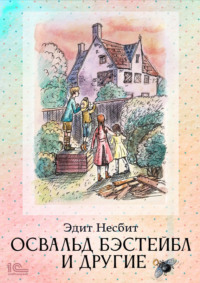 полная версия
полная версияThe Prophet's Mantle
'Very well,' she said; 'I will do what you tell me. But, oh, tell me all you know; tell me where he's hurt; did you see? Will it be dangerous? For pity's sake tell me what you saw, whether—'
Here the door opened, and Roland came in. Her eyes searched his face for re-assurance, but found there something more terrible than her worst fears, and as he opened his lips to speak she cried in a high-pitched voice, quite unlike her own, as she held out her hands as if to keep off something, 'Don't tell me—don't tell me anything—let me go!'
And as Roland stood aside she rushed from the room. Litvinoff closed the door.
'He's dead,' said Roland.
'I know. I knew that directly I put my hand on him. I have had my hand on a man shot dead before to-day.'
Roland sat down on a low chair. It was the one Clare had occupied half-an-hour before. There on the little table by it lay her work-basket, and some pretty useless bit of sewing, and all the little gilt working implements which she had put down when she went to meet her father. Roland's eye fell on them, and he groaned.
'Good God, Litvinoff, what a terrible thing! What a frightful blow for them!'
'Does Mrs Stanley know?'
'Yes.'
'How soon can the doctor be here?'
'In half-an-hour; but he'll be no good when he does come.'
'Not for him, but Miss Stanley may need him. Her face as she passed out of the door was not reassuring.'
Roland groaned again.
'What a horrible world it is!' he said.
His father dead, his brother estranged, his sweetheart lost to him, and now this new calamity had fallen near him. 'It never rains but it pours.' And it seemed to be raining misfortunes in Firth Vale.
'It is a horrible world,' said the other; 'but reflecting on that truth will not aid anyone just now. Is there nothing we can do?'
'Not that I know of, but we won't go till the doctor comes.'
'Certainly not; and in the meantime let me suggest that a little of this brandy would not be amiss, if you don't want him to find a patient in you. You look uncommonly shaky.'
Roland accepted the suggestion and the proffered glass.
'Miss Stanley's mother seems to have her wits about her?'
'Yes, Mrs Stanley's a sensible woman—but she's not Miss Stanley's mother. Mr Stanley was married twice.'
'There are no other children?'
'No.'
'Poor woman,' said Litvinoff, sincerely enough, though for a certain reason he was not displeased to hear that Clare was an only child. 'He seems to have been a rich man,' went on Litvinoff, glancing round the room.
'Yes, he had more than he knew what to do with. It seems hard that he should have had to leave it all so suddenly,' said Roland, growing sentimental.
'It is a great pity men have to leave their wealth behind them. If they could only take it with them, there would not be so many young people growing up in vicious idleness.' Then, as it suddenly occurred to him that this might possibly be considered personal, he went on in his most approved didactic manner,—'Since death is inevitable, how lucky we ought to think it that so few people have anything to live for. I believe to a great many people the best thing in life is the certainty that some day or other they'll get out of it.'
Roland did not answer. There are moments when moral reflections are particularly hateful.
The doctor arrived sooner than they had hoped, the man-servant having met him about half-way between Aspinshaw and his own house, but of course he could only confirm what they all knew. The whole contents of the gun had lodged in the lungs, and death must have been instantaneous. He asked the two young men a good many questions as to the manner of the accident, but of course they had not seen it, and were unable to throw any light on the cause of the disaster. He must have been carrying the gun full-cock, and the concussion, when he brought the butt down on the ground, must have started it.
'Mrs Stanley bears up wonderfully well.'
'And his daughter?' put in Litvinoff.
'Well, the poor child's crushed at present, but she'll soon be all right. Young hearts soon throw off their troubles, thank Heaven! I shall have to trouble you two gentlemen at the inquest,' he said, as he got into his gig and was driven off.
Roland Ferrier and Michael Litvinoff walked home almost in silence, consumed a dinner enlivened by Miss Letitia's comments on the events of the day, and, when she had retired in tears, passed one of the most melancholy evenings in the recollection of either. Roland did his best to perform the difficult part of genial host to the guest who had been introduced to Thornsett under such inauspicious circumstances; but he was a young man who had not that within him which enables men to resist the influence of the immediately surrounding circumstances, and his attempt was a dead failure. Litvinoff could, perhaps, have succeeded with a desperate effort in raising the cloud of gloom that hung over them both, but it did not seem to him that the game was quite worth the candle, and he let it alone.
Under the circumstances there could be no shooting, and none of such social entertainments as would certainly otherwise have enlivened his visit, and the prospect of his first Christmas in an English country-house looked very bleak.
'I suppose one mustn't smoke here,' he said aloud to himself, when, the long evening over, he reached his bedroom, and sank down into an easy-chair before the brightly-burning fire. 'That antiquated lady is the sort of person who would go mad if she smelt smoke in one of the bedrooms. It is a great bore. I want to think—and how the deuce am I to think if I can't smoke!—and I must think. Yes, it must be done; they must put it down to my foreign ways,' he added, as he drew out his cigar-case and lighted up.
Something in his surroundings reminded him of that night in October when he had saved the life of the man who was now lying dead at Aspinshaw.
'Poor old boy,' he said, 'I didn't renew his lease of life for very long, after all; but I expect he lived long enough to have done almost as much for me as he could have done had he lived longer. Perhaps my "views," as he would have called them, will not stand so much in the way now. My crushed young host told me that she is beginning to share those views and to be enthusiastic—thanks to that mysterious entity, Petrovitch. I owe him that; I wonder if I owe him anything else? I do owe many sums to many people. He had me for ten pounds, though, any way. Pardieu! I hope he won't try that again, or I shall have to stay down here permanently. I shall attend a funeral in a few days, I suppose. I wonder when I shall attend a marriage? She was obedient to-day—a good sign. Things will go smoother so.'
He puffed at his cigar in silence a few minutes, then he spoke aloud again, 'And so that was John Hatfield, and he is one of us—or half one of us. By Jove! that makes me feel a cursed traitor—that merits death. Well, I'm not afraid of that, anyhow, nor of anything that may come after. I've got memories enough to make a hell of my own here, and death would be the end of them, at any rate, not the beginning. And yet one must live, I suppose, though I don't feel so sure of that to-night. Poor little girl—dear little girl! I wish you were the heiress of Aspinshaw. The real heiress is pretty and charming, and a lady,' with a rather bitter laugh, 'and she is beginning to have "views;" but somehow I can't get you out of my head to-night.' He moved his hand to and fro before his eyes, as though to clear away the smoke. Then he rose. 'Curses on conscience—curses on principle!' he said; 'I must see if sleep will do it;' and he went to bed.
During the next few days there was nothing to do except to call at Aspinshaw every day and ask after Mrs and Miss Stanley. This was an obvious duty, but as an occupation it was not engrossing. On the second day, young Ferrier offered to 'show his guest over' the mill, and Litvinoff, always glad of a new experience, joyfully consented. The mill was charmingly situated in a little hollow in the hills, with a big reservoir above it and a little stream below. On one side was a wood, where a good many hollies kept up the impression of greenness, though all the other trees were sere and brown. On the other side was a very steep incline which shot up almost like a high wall, and was bare and rugged and rocky, and from the top some rude steps cut out of the grey rock led down to the mill. While the workings of the machinery were being explained, and the various processes exhibited, it did not escape the Count's observation that the men looked particularly discontented, and that there was none of that deferential submission in their manner to Roland which he had been accustomed to see in the manner of workmen towards their masters.
'What's the matter with the men?' Litvinoff asked, as they walked back to Thornsett. 'They looked uncommonly disagreeable. My friend John Hatfield doesn't appear to be the only one who is dissatisfied with the munificent two pounds a week.'
'John Hatfield! What a memory you have for names. Oh, they're not dissatisfied with the amount of their wages. On the contrary, they only wish they could go on at the same rate. But they soon won't have any at all from me. The mill stops working at the end of the year, and they've somehow got it into their heads that I'm responsible for it, whereas it's just about as much my fault as it is that tree's.'
'Is it any one's fault?'
'You know that it is my brother's. He made the quarrel, and forced it on me, knowing what the results would be.'
'And the results to these men will be—'
'Starvation, I'm afraid, for some of them, poor fellows, and very short commons for them all; but it's rather hard that I should be blamed for it.'
'Oh, beautiful system!' said Litvinoff; 'splendid organisation of industry! Two brothers quarrel about nothing in particular, and a hundred men and their families have to starve in consequence.'
'It's not the fault of the system, but of my father's will and my brother's mad temper; but anyhow it is not my fault.'
'Well, your father's will is distinctly part of the system; but, as you say, you are not to blame. No, Ferrier; you are certainly the most hardly done by. As to these "hands," as you call them, qu'importe? It is you who are to be pitied. It is so much harder to be blamed than to starve.'
'What a cool fellow you are, Litvinoff!' Roland laughed, but was yet a little nettled too, for, like all Englishmen, he hated irony. 'You're always mocking at something or somebody. But perhaps you forget that I shall have hardly anything to live on either—a wretched hundred a year or so.'
'A hundred a year,' said the Count, in the tone of one who is dealing with a difficult arithmetical problem, 'is just about two pounds a week. Now the other day you said that two pounds a week was "not so bad" for a man with a family; and, with all your misfortunes, you are not what you English people call "a family man."'
'But then you must remember how differently those sort of people are brought up.'
'I do remember it.'
'They don't have the same needs as we do.'
'Don't they?'
'No. What do they care about music or art or poetry or travelling? Fortunately for them they haven't the tastes that run away with money.'
'They have a taste for food and for warmth, I suppose,' the Count was beginning, when Roland interrupted him.
'There, Litvinoff, it's no good; you'll never convert me. I'm a Radical, not a Socialist. Let's talk about something else.'
'By all means. To return to John Hatfield. I noticed in the mill to-day that he did not participate in the general scowl.'
'No. I don't think he bears me any ill-will. Our relations with the Hatfields are peculiar. When my mother died—it was before my aunt came to live with us—Mrs Hatfield took charge of my brother and me, and was a sort of foster-mother to us. Her daughter Alice was our playfellow, and a dear little girl she was.'
'Was that the girl you said had—well, not acted very wisely?' asked the Count, feeling an insensate longing to talk about Alice, or to hear some one else do so.
'Yes; that was the girl,' said Roland. 'She was as sweet a little girl as you would wish to see.'
Litvinoff mentally endorsed this statement to the full. Aloud he said,—
'What was it—the old story?'
'Yes. She met some fellow at Liverpool; I suppose lost her heart to him, and gave the world for love, and considered it well lost, as they say. Damn the brute! I wish I had the handling of him. I should like to have half an hour with him without the gloves.'
Litvinoff was conscious of an insane desire to give Roland his wish, and try which was the better man, but he said quietly,—
'You don't know him, then? I suppose nothing has been heard or seen of her?'
'No, only—it's rather funny—when I went to the Agora that night I fancied I saw her face, but it must have been fancy.'
'Of course; unless,' added the other, goaded by the Imp of the Perverse—'unless her lover was a gentleman interested in social reform.'
'Not he,' said Roland contemptuously; 'more likely some fool of a counter-jumper or clerk. You know I looked upon her quite as my sister, and I was very fond of her, and all that.'
'Yes?' interrogatively.
Roland had not meant to say anything more; but after that 'yes' he found himself going on,—
'And that's why it's so deuced hard that my brother should blame me for it. Upon my soul, I seem fated to be blamed by everybody I know for everything any one else has done!'
'That, then, was your brother's accusation?'
'Yes. At least if it wasn't I can make neither head nor tail of anything he said. But I didn't mean to have said anything about it—it's too preposterous! I don't know how it is, but I'm always finding myself telling you things that I didn't mean to tell any one. I wonder how it is? Natural affinity, I suppose.'
'I suppose it's because you know I am interested in you,' said Litvinoff cordially, as they turned in at the gate of Thornsett Edge.
'It will be very dull for you here,' said Roland, beating the shrubs lightly with his ash stick as they walked up the path; 'and, I am sorry to say I shall have to be out this evening. I must go down to our solicitor to arrange about several things. You won't think me an awful bear?'
'Don't mention it; I shall be very well amused, I doubt not. I can take a walk if I find I miss you very much, and then I shall be sure to lose myself, and there is some excitement to be got out of that.'
That evening John Hatfield was sitting on the oak settle by his hearth, his wife with her knitting in the substantial rocking-chair opposite. The interior was cosy and bright enough. A high wooden screen protected the inmates from any cold air that might else have come through the door, which opened straight from the house-place into the street. A short red curtain hung in front of the long low window, that was nearly as wide as the room itself. There was a chintz flounce to the chimney-piece, and a bright round table, on three legs, in the middle of the room. There was a good deal of shining brass about, and a few pieces of old china. Mrs Hatfield, a small fair woman, with grey, short-sighted eyes, had more lines in her face than her years should have traced there. But the poor age much more rapidly than the rich. Significant reflection. And every trouble leaves its signet on our faces, and Mrs Hatfield's trouble had been a heavy one, and its traces were easily discernible. So thought Count Litvinoff, as he tapped at the door and entered John Hatfield's house, and the thought was not a pleasant one. Derbyshire was certainly not the place to come to for pleasant thoughts, or pleasant incidents either.
'Is't thee, man?' said Hatfield, leaning forward to discern the features of his visitor in the comparative gloom by the door where he stood. 'Come in—come to the fire. Here, lass, this is the chap I telled ye on.'
As Litvinoff held out his hand to Mrs Hatfield her husband went on,—
'Ay, shake his hand, lass; you don't so often get to shake hands wi' an honest man, and a brave man—'
Alice's father speaking of him to Alice's mother! Another pleasant incident for Count Litvinoff!
CHAPTER XX.
IMPROVING PROSPECTS
CLARE STANLEY was the mistress of Aspinshaw, and of a good deal of bricks and mortar, stocks and shares, and Three per Cent. Consols besides. Mrs Stanley was comfortably provided for, but it was Clare who was to profit by the hard work, the self-denial and forethought of some three generations of Stanleys, or, as some might think, of their greed, their grasping, and their over-reaching of their less crafty fellow-men.
The will that had laid the burden of wealth upon her, at an age when most young women of her class are engaged in constant differences with their parents and guardians on the subject of pin-money, had been the one act of eccentricity of Mr Stanley's whole life.
For some days her grief for her father's loss had been too absorbing to permit of her thinking of much else besides, but on this first day of the new year she felt more able to think, and as she sat alone by the drawing-room fire she began for the first time to realise her position. About one thing she had made up her mind; she must leave this horrible house, where the shadow had fallen on her which she felt just then could never be lifted again.
Between Clare and her father's second wife there had always been perfectly cordial relations, but they were not bound together by any ties of love.
Mrs Stanley had always done her duty to her husband and his child, but hers was a cold nature, and not one which had drawn out Clare's heart towards itself. She was now going to stay with her own relatives, and was perfectly willing to take her step-daughter with her; but the girl decided, without much need for reflection, that there would be many things better than to be buried alive in a Yorkshire village, with no one more congenial to talk to than Mrs Stanley or Mrs Stanley's relations, whom Clare had been wont to term 'the fossils.'
An unposted letter lay on the little table at her elbow, in which she had accepted an invitation to spend an indefinite time with the Quaids. She thought that in London, away from the associations of the recent past, she would be better able to plan out the course of her future life. She knew that that course would now be a very different one from what it would have been had she had the planning of it three months ago, before she met Count Litvinoff or spent that evening at the Cleon. She was sorrowfully glad that her father's will was what it was, for she was conscious in a vague sort of way that wealth meant power, and she was determined that in her hands it should mean power to do good and to make others happy. Her plans went no further than this at present, and she knew that even to carry this out she would need teaching and help and counsel from those who had more experience of the world and its needs than she had. It was, perhaps, this thought that had mainly influenced her in her acceptance of Mrs Quaid's very kind and cordial invitation, for Marlborough Villa was not the most unlikely place in the world at which to meet some one who had just that which she lacked. There she had first been forced to think; perhaps there she would first be taught how to act.
Why does one never learn at school the things one needs when one leaves it? 'How much there is to know—how much there is for me to learn,' she said to herself, with a little sigh, leaning forward and gazing into the glowing fire, resting her elbow on her knee and her cheek on her clasped hands.
She started and rose at a loud, clanging ring of the door-bell. As she had expected, the servant announced 'Count Litvinoff.' He came forward with a low and deferential bow.
'You must forgive me,' he said, 'for calling on you on Sunday afternoon, which, I believe, is not the rule in England; but I heard that you were leaving Aspinshaw to-morrow, and I could not run the risk of not seeing you again.'
'We are always pleased to see you,' said Clare; 'but I am not going to London for some time yet. There will be a good deal of law business, I suppose, and it is not fair to carry the trouble of that to my friend's house. Is Mr Roland well?'
'He is on duty,' said Litvinoff; 'he has gone to a chapel with his aunt, which is good of him, as his views are not that way.'
Clare drew a breath of relief. She had not felt comfortable in Roland's presence since that interview with Litvinoff in the National Gallery.
'I myself shall be returning to London in a few weeks,' the young man went on. 'I have already stayed as long as I at first intended to do, but now Ferrier is good enough to wish me to stay until the household at Thornsett Edge is broken up.'
'Ah, yes, I had forgotten that. What a horrible thing! What are they going to do?'
'I believe Mr Roland will live with his aunt at Chelsea.'
'We seem to be all going to London,' said Clare, with an effort to be as cheerful as possible.
'True; but London is so vast, and in it I know so few people whom you are likely to know, that I feel I might as well be going back to Siberia for any chance I shall have of seeing you.' This with the air of one who would as soon go to Siberia as not while he was about it.
'Oh, I daresay we shall see each other,' she answered, leaning back in her chair and trifling with a big screen of peacock's feathers, which she had idly taken up. 'I'm going to stay with a lady who is madly anxious to know you.'
Count Litvinoff looked intensely surprised, as though that had been almost impossible.
'I think I told you about her,' she continued; 'Mrs Quaid, who belongs to the Cleon, you know, where I heard all about Socialism, you remember?'
'Oh, yes, I remember,' said Litvinoff, which was true. He did.
'I do hope I shall see you again, because you and Mr Petrovitch are the only two people I know who can help me.'
'It is a great privilege my fellow-countryman shares with me, Miss Stanley. May I be the first to hear of what help you stand in need?'
'I daresay you have heard,' she answered, 'that my father'—here her voice trembled a little—'has left me nearly all his money, and it is mine now, though I am not of age.'
Ah, no, Count Litvinoff had certainly not heard that.
'And then, you see,' she went on, knitting her brows under the stress of the difficulty she found in putting her thoughts into words, 'the question is, what am I to do with it? A little time ago I should have found it easy enough to do with it what every one else does; but I have been thinking a great deal—a very great deal lately—ever since I heard Mr Petrovitch; and now I feel the responsibility of it so much more than I should have done before.'
Count Litvinoff thought to himself that that was the sort of responsibility he was admirably adapted to share. He merely looked sympathetic, and Miss Stanley went on.
'And then I feel sure money may be a fearful curse if one doesn't use it properly. Of course, I can't disguise from myself that this money was made in the usual way, and that others have lost all that my father and his father have gained, and I wish I could think of some way in which it might give as much happiness as it would have done had it been left in the hands of the workers who toiled to produce it. You are one who should be able to advise me. What shall I do?'
Litvinoff's hair almost stood on end. This was getting his own coin back with a vengeance.
'My dear Miss Stanley,' he said gravely, 'if I were to advise you in the only way which seems possible to me now, your friends would all look upon me as your worst enemy—as an adventurer, as a rogue. Whereas I desire to be looked on as your faithful friend and servant—as the man who, more than all others, would go through fire and water to do you the slightest service.'
'I should hardly have thought you would have cared what my friends or anybody else thought of you,' was Miss Stanley's only reply to this fervid declaration.
'Under most circumstances,' said the Count, with a little wave of his hand, 'I do care for nothing and for nobody; but'—he went on, with a slight tremor in his voice—'rather than incur the dislike of any one whom you respect and love, I would abjure every principle, and sacrifice every cause.'









